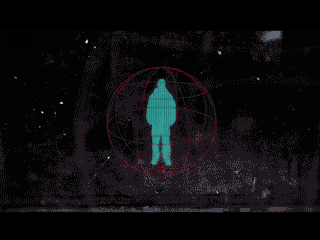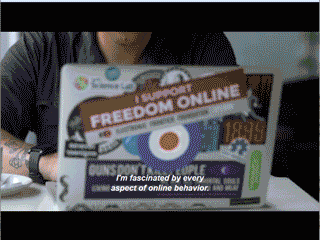This review of the BBC’s “Cybercrimes” documentary series is by the talented, entertaining, and really, really angry Matthew D. Phelan. Upon re-reading this empassioned screed, our humble scribe re-watched a few episodes, thinking, “It can’t really be as bad as that.”
It was. Enjoy.
God, I hate this show. Cybercrimes with Ben Hammersley is a six-part documentary series released by the BBC in 2014. It’s currently available on Netflix streaming both internationally and here in Hell. The focus of the series (which was funded in large part by a thing called The Open University as a hoped-for tie-in to their information security course material) is that this smug, Gen-X ponce, the titular Ben Hammersley, has read the same two dozen or so major news pieces about darknet/deepweb/hacker crap that everyone else has. This includes—I would say “most crucially”—you.
You already know just about every useful kernel of information that Cybercrimes with Ben Hammersley was ostensibly produced to deliver.
Do not watch this show.
God, this show makes me so angry.
It’s a waste of the viewer’s time, sure, but, more irritating still: Cybercrimes with Ben Hammersley is just an insulting waste of documentary resources. Cybercrimes trots the globe, traveling to Nigeria, Sweden, and across the continental United States, so that Ben Hammersley can explain obvious shit to you in his posh English accent while walking down a variety of crowded city streets. Cybercrimes sets a motherboard and hard drive on fire to illustrate cyber warfare. Every talking head has to be interviewed by Ben Hammersley himself, with shots illustrating that they have laughed at his jokes or that Ben has laughed at theirs—proving he’s smart enough to appreciate the delicious ironies of our digital age. There’s uninspired drone camera footage, a fisheye lens strafing every computer screen in sight, and some Adbusters-style Adobe After Effects work that looks designed to trick you into thinking that you’re watching an infographic. Just look at this one about bitcoin and ask yourself, “Do these images convey any extra contextual information that I’m thankful to have?”
(They don’t, by the way.) In short, Cybercrimes with Ben Hammersley squanders an ample budget on fruitless travel and empty visuals producing, by turns, a laughable and agonizing bouquet of documentary cliches.
The only big documentary trope that Cybercrimes doesn’t dust off (I think) is using time lapse footage of storm clouds over the U.S. Capitol Dome to connote some sort of political conflict. (I was drifting off while watching the third and fourth episodes. So, the show may have used it somewhere.)
By what criteria comes this rage? Doesn’t “credit belong to the man who is actually in the arena,” or whatever, as Teddy Roosevelt, that asthmatic Imperialist, once famously pasted onto an image macro of a bull moose?
Yes. Fine. Sure. But were you to pick, at random, any journalist or blogger from your favored tech site of choice, that person could have contacted all these sources via email, interviewed them on camera, written better scripts than these six, insipid, 25-minute episodes and likely would not have mislabeled U.S. Senator Chuck Schumer as a Republican, or claimed that Lagos, Nigeria is home to some of the most expensive office space in the world, or that the Onion router (TOR) and the darknet are exactly the same thing. This show is farts. Speaking as someone with a modest amount of experience as a journalist and as someone who knows other journalists, someone who has been in the metaphorical “arena” in other words, I feel totally justified in saying that. This show is tacky, and unpleasant, and unfit for airing in public, in a manner not dissimilar to farts. I mean, Jesus Christ.
As to that first rhetorical question about “criteria”: There are maybe four discrete things that any documentary can accomplish that sort of justifies its existence (I would argue).
In the first instance, there’s the documentary that offers privileged access to a world or event that the viewer would be unlikely to see, to their detriment, without the sage and intrepid efforts of the filmmakers. A wide variety of cool and dope pictures fall into this category: Jennie Livingston’s seminal look at New York City ball culture, Paris is Burning (1990), D.A. Pennebaker’s intimate portrait of the 1992 Clinton campaign The War Room (1993), pretty much the entire oeuvre of the Maysles brothers, Errol Morris’s Gates of Heaven (1978), quite a few Vice News docs, nearly all nature films, that televised Venezuelan coup chronicle The Revolution Will Not Be Televised (2003), the glorious hot mess Queen of Versailles (2012), whatever; your mileage may vary. It’s a big list!
Granted, any documentary focused on hacker culture or complex digital events from our recent history is at a distinct disadvantage in this category. So many of these things simply can’t be documented on film in a dynamic or interesting way, without serious creative effort. And yet, still, Cybercrimes with Ben Hammersley manages to slag, forfeit, and cheat on this with a ton of self-serving and wasteful diversionary tactics.
For example: Ben Hammersley, his mustache, and film crew travel all the way to San Francisco to sit “at the very table” at the visually banal cafe from which infamous darknet drug kingpin, the “Dread Pirate Roberts” himself, Ross Ulbricht, allegedly managed his TOR-anonymized Silk Road drug market. Here, at that unassuming (deeply boring) table, Ben Hammersley shows us Ross Ulbricht’s LinkedIn profile. Can you believe it!? Can you even contain your excitement?!
Hammersley’s laptop is encrusted with stickers, including one of those “I Support Freedom Online” bumper stickers from the Electonic Frontier Foundation. He might disapprove of the fact that I think his show is a pool of rancid milk that some occult force has transmuted into television, in other words, but he would no doubt defend to the death my right to say so online.
In the second instance, there’s the category of documentary that’s produced with an eye towards some kind of vigilante justice: most recently Making a Murderer (2015)—a thing maybe you should watch on Netflix instead—but also The Thin Blue Line (1988), Blackfish (2013), the Paradise Lost series (1996, 2000, and 2011), and Spike Lee’s harrowing Hurricane Katrina four-parter When the Levees Broke (2006). Plenty of documentaries that succeed in this vein are made-for-TV fare; quite a few PBS Frontline or CBS 60 Minutes segments achieve a similar quality too—facts that are germane here because Cybercrimes with Ben Hammersley deserves no special treatment for being a runty, short-run, television documentary series.
This stupid fucking show just re-explains stuff—most often with that poisonous evening news garnishment of fear and imminent danger.
“I’ve actually seen a scammer make someone so ill that they’ve been put into a hospital,” one of Cybercrimes‘ experts says of Nigerian spam emailers, in what feels like a Brass Eye sketch. “And while they were in the hospital, he’s still sending them emails, trying to steal the money.”
What the hell even happened that could make these sentences true? Cybercrimes does not elaborate.
The closest that Ben Hammersley—his rosy cheeks gleaming with self-satisfaction—ever comes to advocating against an injustice in this six-part series is when he repeats what should be the obvious interpretation of the whole Edward Snowden affair (Episode 6, “Surveillance”). You may perhaps share this view, that mass surveillance of the general public is authoritarian, and wrong, and more than likely bad for democracy.
Immediately, however, this sentiment is undercut on Cybercrimes by Ben Hammersley’s own attention-hungry narcissism. Like cable “true crime” garbage you might accidentally watch on a Saturday afternoon rather than be productive, Cybercrimes has staged dramatic reenactments, like Snowden walking around a Hong Kong lobby holding his tell-tale Rubick’s Cube. Thrill to the sight of a guy who looks kind of like Edward Snowden typing in a hotel room and draping a blanket over his head. That’s tradecraft, yo! But most obnoxiously of all, Cybercrimes keeps doing this ridiculous “sleight of the hand” thing in editing—like a charisma-free version of Orson Welles’ F for Fake (1973)—in which Ben Hammersley is substituted in for the fake Snowden at the end of these dramatizations.
Just as a thought experiment: Imagine a glossy magazine feature where the majority of the photos are of the writer instead of the subject.
Anguish.
I’ve lost my train of thought, because I am so infuriated by Ben Hammersley. Ben Hammersley is a maniac. His glib hubris is … it’s really something else. It’s like watching a man on a first date, who has nervously had too much to drink, talk himself up.
Anyway: A third means by which a good documentary tends to distinguish itself is by being aggressively and brilliantly conceptual. I’d include many of Adam Curtis’ documentaries in this category (a great example as, like Cybercrimes, Curtis’ work has also been mostly produced by the BBC). Do any of these strike you as worthy examples? The Black Power Mixtape 1967-1975 (2011), The Pervert’s Guide to Ideology (2012), The Act of Killing (2012)? I dunno. These films are a lot like pornography in that you know them when you see them.
If it’s not obvious by now, Ben fucking penny-farthing fixed-gear Hammersley is not up to this task. Please bask in this:
Can you fucking even believe this groaner?
This is the paucity of wit we are dealing with here, from a man who is a paid lecturer, here in America and abroad, on these subjects. This man is a non-resident fellow at the Brookings Institute and an editor-at-large for Wired UK, and yet repeatedly he and his mustache come across like direct descendants of F.F. Woodycooks from that Mr. Show sketch “Take Back the Streets.” (I am congnizant of that fact that Woodycooks was based on Chicago detective and “street smarts” lecturer J.J. Bitenbinder. It’s not important right now. What is important is the way that Hammersley has brought Woodycooks’ “shaking the crimestick” into the 21st Century.)
The harder I think about this show, the more vivid and fully realized my vision becomes of Ben Hammersley and his cushy, comfortable life as an idea festival carnie, and the sadder I become. Google Image Search has been an especially punishing enabler in this unhealthy enterprise. Bear witness:
I would like to know the speaking fees Ben Hammersley has collected to walk on stage barefoot, like he’s Paul McCartney on Abbey Road, and change the paradigm with his “Target” wordplay.
Lastly, the final means by which (I think) a documentary can establish its quality is with some interesting gonzo stunts or by virtue of the filmmakers trying themselves to accomplish something amazing while simultaneously documenting it. I can’t really think of any universally defensible ones right now, other than maybe Nathan for You. These are an acquired taste and vary greatly in terms of quality. I’m not really willing to stick my neck out for Michael Moore or the Yes Men at the moment (or Morgan Spurlock ever), given that I am right in the middle of a vituperative screed just asking for a nasty reprisal. Let’s all concede then, that there are surely classic documentaries that are classics exactly because the filmmakers engineered some sort of brilliant stunt.
This does not happen on Cybercrimes with Ben Hammersley, of course. I believe at one point in the episode on piracy Ben Hammersley hands a random Swede (supposedly) on the street a burned copy of a Townes Van Zandt album to prove a point (hahahaha) about the nebulous gray zones in copyright law. That was sort of a stunt. That’s the extent of this show’s rakish stuntery.
Unintentional dog-wimpering noises. Deep breaths.
There is more to life than this.
A reality worth reemphasizing here is that TV documentaries are perfectly capable of these four goals on whatever budget Cybercrimes had. But instead, this show used its resources to give a generic, if Vice-ified, “television news magazine” production gloss onto stories other people had reported better and in more detail elsewhere. In this respect, Cybercrimes is something like very expensive “illustrated blogging.”
As my new favorite Netflix user described it, in a beautiful one-star review, “Show called Cybercrimes and the promotional image is of a man dressed like a 1920’s mill worker writing with a pencil and paper on top of a car in the middle of a street. Watched 2 episodes and it seems like it’s trying too hard to seem like a cool show and not hard enough at actually being a documentary series.”
I would submit to you that Adam Curtis would never need to brag about his teenage mixtape making skills, because the soundtracks to his docs are already indicative of his high class musical tastes. People assemble Spotify and YouTube playlists just to get a handle on his exquisite soundtrack curation. It’s routinely a feature of the Wikipedia entries for his films. This dumb mixtape anecdote by Ben Hammersley is like if Martin Scorsese made time during his Bob Dylan or George Harrison docs to tell the audience that, as a young man, he himself had won every 60s music bar trivia night that he, Martin Scorsese, had ever participated in. Was there no one on hand during the production of Cybercrimes to save Ben Hammersley from himself? Who were these enablers and bad friends?
(God, this show makes me so angry.)
A weird thing about Cybercrimes’ life online is that Cory Doctorow, a normally bright guy, called it indispensable, when dispensable is exactly what it is. Maybe this is because he teaches a course at Open University, as he readily admitted while recommending the series on BoingBoing, but more likely (I would like to think) because he just assumed it was good without seeing it. It’s an honest mistake that public figures are liable to make in their numerous informal dealings with other public figures. No one in their right mind could have watched this shit and called it indispensable.
In the internet age, there is no time for second-guessing oneself. Only the most expedient, stream-of-consciousness visual cliches could be employed on Cybercrimes with Ben Hammersley.
(I will admit that I got a lot of joy out of the close-up on those dollar store pirate hats. That’s one of this show’s best moments.)
—
This review is now a little over 2000 words long, or something like a 7-10-minute read by Longreads metrics. Ideally it has served its purpose: to spare you the roughly two hours that you might have otherwise wasted by watching Cybercrimes on Netflix. If this review is coming too late for that, hopefully it has instead provided some form of succor or catharsis for your pain.
I would like to end this piece, twelve-step style, with a benediction:
I ask humbly that my Higher Power deliver me
from the comfort, self-regard, and vanity
that has oppressed Ben Hammersley.
May adversity forge me into a tool
that benefits all those in the world of the living.
May that my Higher Power would protect me
from ever having to wear a headset with a beige microphone that looks like a muppety pimple,
at an event for delusional white-collar criminals and tax-dodgers.
Yea, though I walk
through the valley of the shadow of death,
I will crave no spotlight;
for thou art with me;
Thy DMs and thy private emails, they comfort me.
Let me never forget that the people’s time is sacred,
that their attention must be earned
at high personal cost and good fortune.
For these things, I ask my Higher Power
for strength.
And, lo, surely goodness and mercy shall follow me
all the days of my life;
And I will dwell on the wrong side of the tracks
walking distance from authentic Mexican cuisine forever.
Matthew D. Phelan is a reporter at the interesection of paranoia and real life in the 21st Century. His work has previously appeared at Gawker, Wonkette, The Onion, and Chemical Engineering magazine.
Categories: Bitcoin, Crime, Cyber, Dark Web, Deep Web, Edward Snowden, Hackers, Hacktivism, Humor, Journalists, Leakers, Leaks, Long Reads, Media, News, Opinion, Reviews, Ross Ulbricht, Silk Road, Television









I first met Hammersley in 2004 in San Francisco and a couple of times since. He is one of those self-promoters…a bullshitter of thehighest order. A failed African Studies student, then a failed journo, now a self-proclaimed “futurist”, despite having zero qualifications, let alone tech qualifications. This documentary is exactly what you’d expect from a fella like that.
LikeLike
Inneresting! Thanks for that intel!
LikeLike
He wrote a book titled “Hacking Gmail” for chrissakes….giving deep insight into how to use, ahem…Gmail.
LikeLike
#TheHackersChoice
LikeLike
This made me laugh so hard I cried – thank you! Came across it on netflix and couldn’t believe it. That 25 mins was totally worth the time I have spent laugh-crying over this post
LikeLike
Oh my god the completely unnecessary, completely ridiculous parking lot car interviews??!!
LikeLike
This series has a lot of ironic fans amongst documentarians, who tell us they enjoy watching it drunk and heckling throughout.
LikeLike